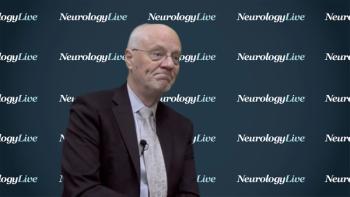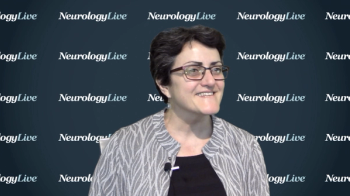
Patients with CLN2 disease have shown a maintained treatment benefit, high rate of response, and lowering rates of seizure occurrence over 3 years in an ongoing extension trial.

Patients with CLN2 disease have shown a maintained treatment benefit, high rate of response, and lowering rates of seizure occurrence over 3 years in an ongoing extension trial.

The professor of epilepsy and medical education at St. George’s University Hospital London spoke about the number of challenges plaguing epileptologists when treating patients who present with possible status epilepticus in the hospital.

The section chief of neurology at Nationwide Children's Hospital spoke about the role of wearable technology in pediatric epilepsy, an area that has the potential to make a major impact on treatment.

The podiatrist and chief executive officer of Naboso Technology spoke about the potential of textured insoles to help patients with multiple sclerosis improve gait, posture, and balance.

The GW Pharmaceuticals cannabidiol formulation, marketed as Epidiolex, did not show any evidence of clinically relevant drug-drug interactions when co-administered in patients with epilepsy.

While 65% of patients indicated that they no longer have epilepsy, only a quarter of the study population were actually completely free of seizures postoperatively.

The professor of neurology at Cleveland Clinic’s epilepsy center spoke about the limitations of individual physicians in making clinical decisions, and how utilizing algorithm data can help improve epilepsy interventions.

Overall, myoclonic and absence seizures worsened in 1.2% and 15.9% more patients in the placebo group, respectively, than those given perampanel. The reductions in seizure frequency and the increases in seizure-free days were also greater with the noncompetitive AMPA receptor antagonist.

An assessment of 230 poststroke patients determined that neurorehabilitation outcomes and length of stay did not differ between those with poststroke epileptic seizures and those without.

Over 57% of patients who received intranasal midazolam were responders, with status epilepticus ceasing within an average of 5:05 minutes.

Preliminary results from the 4 mg maintenance period of the FREEDOM study, the first in which perampanel has been examined as monotherapy, were presented at the 2019 International Epilepsy Congress in Bangkok.

In a retrospective study, 51.7% of patients achieved seizure freedom while receiving lacosamide, with seizure freedom rates going as high 88.9% for those who were administered the drug as monotherapy.

Neurology News Network for the week ending June 22, 2019.

Findings from SANAD II have suggested that levetiracetam is inferior to valproate in time to 12-month and 24-month remission in patients with generalized or unclassified epilepsy.

This is the first neurotoxin treatment approved for pediatrics 2 to 17 years of age with upper limb spasticity.

The head of the Cleveland Clinic stroke program and medical director of the Comprehensive Stroke Center sat down with Neurology Live for an in-depth discussion on stroke certifications, advanced treatment technology, and the ever-evolving concept of "time is brain."

Four of the 7 patients exhibited significant improvement in all assessed study parameters, which included reduction in the Apnea-Hypopnea Index scale and an improvement in oxygen desaturation index, with 1 patient demonstrating mild improvement; overall THX-110 was generally well tolerated.

The director of behavioral medicine at the Mellen Center for MS Treatment and Research at Cleveland Clinic discussed the importance of screening patients with MS for other conditions for which they are prevalently comorbid, such as depression or sleep disorders.

The professor of neurology at both the University of California San Francisco and King’s College, London, spoke about the results from a phase 2b/3 study evaluating atogepant for prevention of migraine.

While the clinical benefit of the therapy in Alzheimer is still unclear, the dihydropyridine calcium channel blocker increased blood flow by 20% compared to placebo in the brain’s memory and learning center, indicative of preserved cerebral autoregulation.

The director of rehabilitation services at Cleveland Clinic Mellen Center for MS spoke about the impact that participation in the arts can have for individuals with multiple sclerosis in dealing with symptoms of their disease.

The director of the center for circadian and sleep medicine at Northwestern University spoke about the importance of recognizing insomnia as a clinical diagnosis since it affects patients 24-hours a day, not just during sleep.

Abeona Therapeutics is currently planning a phase 1/2 clinical trial to evaluate ABO-202 in Batten disease.

Despite the clinical benefit being limited, the slowing of pantothenate kinase-associated neurodegeneration disease progression—particularly in atypical cases—is a step toward developing a treatment for the orphan disease.

The director of MS neuropsychiatry at Brigham and Women’s Hospital spoke of the importance of not oversimplifying the approach to mental health disorders in individuals with MS, and how the collaborative care model can help.­­­

During the average follow-up period of 3 years, 70.7% of those in the pediatric-onset MS group met the clinical definition for cognitive impairment compared with 59.8% of those in the adult-onset group.

The systematic review and meta-analysis identified cNfL usefulness as a biomarker, with the potential to help differentiate between frontotemporal dementia and Alzheimer disease, as well as Parkinson disease from atypical parkinsonian syndromes.

Solriamfetol (Sunosi, Jazz Pharmaceuticals) is expected to be available in July 2019 in the United States.

Neurology News Network for the week ending June 15, 2019.

Patients with multiple sclerosis who were obese had higher EDSS scores and higher levels of inflammatory IL-6 and leptin in the CSF prior to treatment, as well as lower levels of anti-inflammatory IL-13.